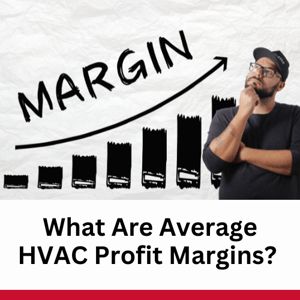
While many of the supply chain delays and service challenges of the COVID-19 pandemic are behind us, they’ve taught HVAC business owners a very valuable lesson: It’s integral to future-proof your operations to sustain business growth, especially in the face of an unstable economy or uncertain horizon. Though you never know what tomorrow will hold, you can prepare with confidence.
The best place to start? With a thorough comprehension of your HVAC business profit margins, a metric that serves as an indicator of your operation’s financial health. Take a look at this business owner’s guide to properly measuring and gauging HVAC profit margins compared to nationwide revenue, along with time-tested tips to future-proof your business for sustainable growth.
How to Measure HVAC Business Growth
First things first, how do you know if your company is already scaling or if it’s even prepared for future growth? These questions are areas for business metrics and analytics to shine. Making a consistent effort to document and track your business’s key performance indicators (KPIs) allows you to judge the overall health of your operation and determine your level of growth over time.
When it comes to business growth, vital KPIs for HVAC business owners and contractors to track include:
- Sales revenue, or the amount of business income that comes directly from your services and product offerings.
- Operating costs, or the total amount of money required to cover operational expenses, such as labor costs and equipment costs.
- Cash flow, or the amount of money readily available to your business after all expenses and debts have been paid.
- Customer retention, or the percentage of recurring customers versus your total customer base.
With these metrics in hand, you can move forward with the most important calculation: your HVAC profit margin or the amount by which your sales revenue exceeds your business costs. First, learn your net income by deducting your operating costs from your sales revenue to calculate your HVAC profit margin. Then, divide your net income by your sales revenue and multiply the result by 100 to obtain a profit margin percentage.
What Are Average HVAC Profit Margins?
 Generally speaking, a successful HVAC contractor aims to maintain a profit margin of somewhere between 10% and 20%. The higher the profit margin, the more pure profit generated from sales. However, several factors impact what contractors consider a “good” profit margin from company to company, with some successful businesses operating at a profit margin well below 10%.
Generally speaking, a successful HVAC contractor aims to maintain a profit margin of somewhere between 10% and 20%. The higher the profit margin, the more pure profit generated from sales. However, several factors impact what contractors consider a “good” profit margin from company to company, with some successful businesses operating at a profit margin well below 10%.
Location, for example, can significantly impact HVAC profit margins. Contractors in urban areas with steep living and operational costs typically incur higher expenses compared to those in more rural, affordable locations. So, while a 5% HVAC profit margin in Casper, Wyoming may signal poor performance in the HVAC industry, this profit margin could indicate positive growth in a high-cost region like New York City.
Outside of locality, a business’s service offerings may also impact HVAC profit margins. HVAC companies offering specialty services can attract higher ticket projects, resulting in higher profit margins than simpler operations that offer basic residential services. High-value services will also attract higher-paying customers, further contributing to sustainable growth.
Strategies for Sustainable Business Growth
To remain profitable into the future despite economic uncertainty—and to reach your desired HVAC profit margins in 2024 and beyond—it’s essential to adopt tactics that will continue to drive business to your company, whether it’s new customers or returning clientele who require routine maintenance or desired upgrades. Consider these top options in support of sustainable growth.
Expand Your Service Offerings
With today’s ongoing advancements in HVAC technology, contractors can stunt their company growth if they fail to keep up with shifting customer demands. To encourage higher ticket prices alongside stronger profit margins, consider the addition of new specialty services, such as Indoor Air Quality (IAQ) technology, variable refrigerant flow (VRF) systems, and smart HVAC solutions.
While traditional HVAC services enable steady revenue, expanding into new HVAC specialty markets powers far more upsell opportunities, ultimately leading to higher revenue and stronger customer retention. By enticing new customers through specialty services, HVAC companies can also better offset the new equipment costs that may come with the addition of new service offerings.
Offer Extended Warranty Services
Customer retention is key to long-term business growth and HVAC profit margin support. Failing to engage customers after an initial installation visit can harm your customer retention rates, resulting in a restraint on your long-term growth. With the help of extended warranty offerings, you can reduce this concern by locking in customers for years on end.
Upon successful upselling of an HVAC extended warranty, your company becomes the customer’s go-to contact, who will be responsible for every future maintenance or repair need. Combining this with the continuous delivery of high-quality services, HVAC businesses can build strong customer relationships that encourage further revenue-boosting upsell opportunities as well as ongoing referrals (more on this below!).
Maximize Your Marketing Efforts
In the modern era of digital consumers, maximizing your marketing efforts is essential for any company looking to expand customer reach and support sustainable growth. Search marketing tactics, including pay-per-click ads, Google local services ads, and website SEO work, can help boost your business’s online visibility when customers are on the hunt for local HVAC service providers.
With 91% of consumers turning to online reviews to support a purchase decision, it’s also important for HVAC companies to practice strong online reputation management. Encouraging positive reviews while professionally responding to negative reviews helps boost your brand’s online credibility and search engine visibility in support of long-term customer growth.
Embrace Partnerships and Referrals
As displayed by the recent pandemic, there are several unpredictable reasons why you could suddenly lose customers. To offset these concerns, HVAC contractors should future-proof their business by continuously embracing partnerships with other local trade workers. From housing contractors to HVAC suppliers, outside trade contractors can continuously recommend your business to others looking for HVAC services in exchange for similar business referrals.
The same also goes for your customer referrals. Even if your advertising or marketing dollars begin to wane over time, remember that word of mouth is free and trusted by customers, no matter what. HVAC contractors should consider offering referral programs that reward recurring customers with service discounts or other incentives in exchange for a successful new customer referral.
Support Sustainable HVAC Growth with JB Warranties
By adopting proven strategies for sustainable growth, contractors can effectively hit HVAC profit margin goals in 2024 and beyond. If you’re seeking a reliable extended warranty to upsell, look no further than JB Warranties’ industry-leading Premium Protection Plans, which offer simple online policy management, quick claim turnarounds, and robust product coverage for ultimate future-proof protection.
Plus, don’t forget to check out the JB Dealer Services Marketplace, where you can easily access tons of business management tools designed to prepare your HVAC business for future growth. We’ve curated a collection of resources that help contractors mitigate risks, effectively handle their expenses, and grow revenue. Now is the time to future-proof your HVAC business with JB Warranties.
Jenna Ochoa
Vice President - Claims, JB Warranties






